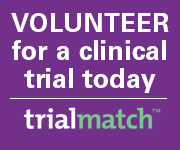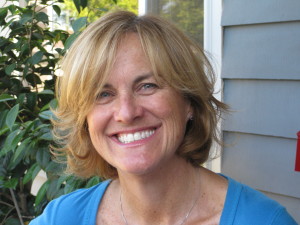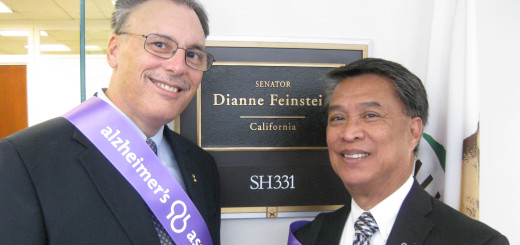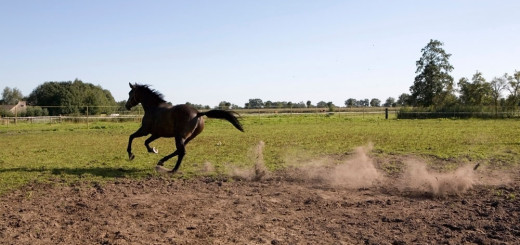Susan has Alzheimer’s disease – but she’s fighting back
With the Alzheimer’s Association International Conference winding down, I thought it would be a great point to reflect on some of the unsung heroes who are critical in making this research happen: participants in clinical studies. Without their commitment, we would not be able to make the types of new discoveries you’ve been hearing about this week. Researchers often say that the biggest barrier to research – other than funding – is finding clinical trial participants.  There are more than 100 Alzheimer’s-related clinical studies going on throughout the country, many of which are seeking healthy participants. To find a clinical trial near you , visit or call 800.272.3900.
There are more than 100 Alzheimer’s-related clinical studies going on throughout the country, many of which are seeking healthy participants. To find a clinical trial near you , visit or call 800.272.3900.
Susan is one of the unsung heroes who are helping researchers understand more about Alzheimer’s. She shares her story here:
My typical day would start with a brisk walk with neighborhood friends and a cup of coffee. We talked about our jobs, family and politics. Then I would run home and get ready for work. I worked in high tech as a VP of Human Resources for a company which had 250 employees. We had employees in the US, Japan, China, UK and Germany. I loved my job and often worked long hours, working in the evening in order to make contact with other employees around the world. In my spare time, I would support nonprofits. I was on the board of three separate organizations at different times. I would get up early in the morning and go non-stop until late at night and loved every minute of the day.
The shock and grief I felt last January when my doctor informed me of my diagnosis of Alzheimer’s was heartbreaking. I loved to work, to solve challenges and be helpful to the company and my colleagues. I am 53 years old and was not prepared to throw in the towel. As my doctor described my limited options for treatment, one piece of information that caught my ear was that I might consider participating in a drug trial. While my previous occupation as a high tech executive was over I could see myself supporting research which could create more positive outcomes for those who will be getting this diagnosis in the future.
My doctor discussed with my husband and me a study that the hospital was involved with. I was a great candidate as I was healthy and was diagnosed early in the progression of the disease. It was made clear to us that while the data from the study would be beneficial to the Alzheimer’s research there was no guarantee that I would directly benefit from the drug. As we learned more about what would be involved in the study, it became clear that this would be a significant commitment on our part to go through the testing required to qualify for the study and then hopefully follow through with administration of the drug every two weeks over a period of a year and a half and additional testing to evaluate my progress. This is my new non-profit job!
As we have progressed through the study we have learned so much about the disease as well as met many wonderful doctors, researchers and fellow Alzheimer’s patients along the way. By embracing the search for positive outcomes to my disease I have also found myself speaking to research students and others involved in the care and support of Alzheimer’s patients about my experiences so far.
For those considering joining a drug trial I would first say do some homework with regards to the drug being studied and the organization supporting the research. After being comfortable with the proposed study I found myself excited about the prospect of contributing to finding a cure for this devastating disease. I have met so many wonderful people during this journey and while I would gladly return to my previous life, I have had many positive experiences. I find satisfaction knowing that I am contributing to something so significant: finding a cure for Alzheimer’s.



















Is it recommended to try 10-20 grams of coconut oil and mcfa oil preventatively or for those in the early stages of Alzeimers Disease?
Please, for the sake of all those who now have Alzheimer’s, or will have it, have a trial with the coconut oil . It is such a safe solution instead of the drugs that have not halted its advances – such as Actos, which has already been pulled off the market in France and Germany, and Avandia wich has increased heart attacks for so many. My husband has diabetes 1 and I know how his behavior changes when his brain doesn’t have enough glucose. If the medium chain fatty acids can provide nourishment to the brain to reverse its symptoms, what a gift you would be giving to millions of people. My husband and I are taking the coconut oil as a preventative and feeling fantastic. This oil is far healthier than the non-hydrogenated ones used by most people. We are fit and healthy and full of life in spite of eating this oil.
I agree with those calling for a clinical trial with coconut oil. My mother was diagnosed with Alzheimer’s disease and finally after several months I was able to get her to try it. There has been significant improvement! Please encourage “the powers that be” to look into this.
My Dear Susan,
I’m very hopeful that your effort will make a difference with your prognoses and the welfare of all the people that are affected but this devastating disease.
I am sorry that you have to fight this fight but I believe if anyone can get through this it will be you.
Please know I will be thinking of you and I continue to visualize your good health and positive attitude.
Love always,
Sandi
I am very interested in the dosage of coconut oil required. My mother recently passed away from Alzheimers and my siblings and I are nervous every time we can’t remember something.
I have done research and found that Vitamin B12 can also be helpful.
I, too, would like very much to know about dosage with coconut oil. Does one take in capsule form, by the tablespoonful – cook with it? Would someone, with this knowledge please share. Thank you.
Susan, I am way late in my response to your email. I am so proud of you and your positive attitude and determination to face this challenge “full on!” I am happy to support you in your upcoming fundraiser. I also look forward to “reconnecting” with you. I will be keeping you in prayer. Much love, Sherry
Dear Susan,
I truly hope that you are on the road to recovery and are part of the cure for this devasting disease. Although we haven’t seen you in a while, when I think of you I see a bright ray of light eager to cheer up others that surround you. You are in our thoughts and prayers.
God Bless You.
Susan & Sheldon
I find coconut oil helpful for my MCI but have trouble with diahrea. I put it in coffee, use it instead of butter in a sandwich, but would like to try other methods of ingesting the oil since I have a sensitive stomach.
Hi Susan; from close experience, I know the best way to deal with adversity is to fight back, hard. You’re doing the perfect thing here. I’ll be on the walk, and my son Austen too if he can get away from work. And our dog Cooper. And most importantly, Cheri will be walking with us in spirit !
Michael
my mother is 91 and got alzheimer’s at the age of 86 and doing fairly well, she has a sister who just turned 100 and does not have alzheimers, would it be beneficial to study the 2 brains.
To those asking about dosages, I have read that if you want to begin using coconut oil, get the unrefined organic coconut oil. Start with 1/4 tsp a day then to 1/2 tsp etc. I am up to 1 tablespoon a day with no tummy issues. The first time I tried, I started with 1 tbsp and was going to the bathroom immediately afterwards. So I stopped and started to do the gradual progression instead. I read that coconut oil is antiparasitic, and that if your tummy has immediate issues with it, that is because it is ridding your intestines of parasites. I believe that Dr. Newport had her husband taking 3-4 tbsp multiple times a day. I don’t think I personally need that degree of help 🙂 But I’m also only 36 and hoping to help prevent any mental issues that are in my family (alzheimers and dementia). Best of luck to you all!
My spouse was diagnose last year April at NIH. It has been a tough journey, but love conquers all. He has early onset , I noticed the memory loss and repeating sentences at 52 yrs old. He did not want to believe it when i told him thats its possible that he has it because of strong family history. Now our lives have change. Please let me know about the cocoa nut oil, we are open to any trial or suggestions. Patiently waiting!
Hello,
My husband was also diagnosed at NIH a few years ago at 54, but I think he struggled cognitively for years before. We too feel our lives have changed so very much. Adjusting is a daily challenge, and I try to be grateful for the good days.
My heart goes out to anyone else in our boat!
Helen
Hi!,I have been giving my mother coconut oil for about a month now but she is in the midstages of the disease so I don’t know if this is helping her. I do know that it is a diareutic item and will cause loose stool but I wonder if this is a good thing to some extent. I know having a clean solon helps in keeping cholesterol under control, eliminated toxins that build up in the bloodstream and increase blood flow to the brain. Can anyone share their info on chelation?
my Dad has Dimentia and also his older brother… and their sister had Alzheimer’s… through research and talking to the doctor’s… i am taking B12 (to help with blood flow) even though my bodies B12 is good… doctor said only to take B12 every second day… before taking you should have B12 blood test to see what your levels are because you don’t want to be taking too much B12. Also taking fish oils to ward off inflammations and Vitamin D.